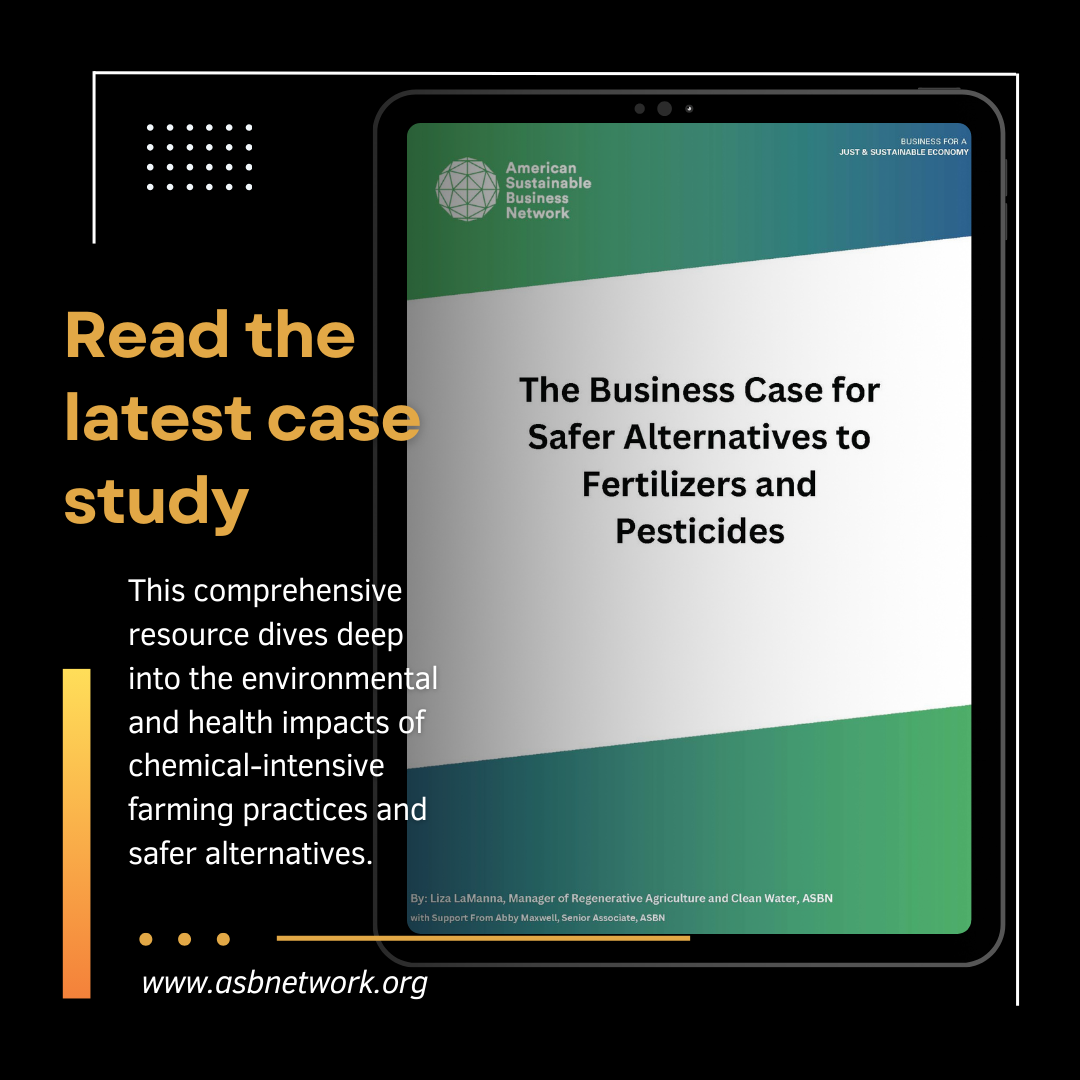By: Liza LaManna, ASBN Manager of Regenerative Agriculture and Clean Water
The American Sustainable Business Network recently released The Business Case for Safer Alternatives to Fertilizers and Pesticides. This resource connects agricultural chemical inputs, like pesticides and synthetic fertilizers, with harm to soil health and the business solutions that exist to avoid dangerous chemicals like those currently negatively impacting waterways across the country.
For example, within the Delaware River Watershed, more than 8 billion gallons of water are used daily, contributing $22 billion in annual economic activity across sectors to the region, making it a vital resource. Runoff pollution – water that has flowed over farm fields, lawns, roads, and other sites, picking up contaminants as it goes – poses the largest threat to clean water.
As agriculture has intensified over the last 100 years, there has been a drastic increase in the use of chemicals, resulting in increased adverse effects on the environment, most notably on soil and water quality. These compounds can contaminate drinking water – creating a public health risk – and can affect the oxygen levels in water bodies, leading to toxic algal blooms and other negative environmental impacts. These are costly to clean up and pose a severe threat to the future of U.S. businesses, local economies, and public and environmental health in rural and urban communities that depend on access to clean water.
Fortunately, today's market offers safer alternatives to chemical-intensive farming, lawn, and turf care methods; these have proven to be more affordable and significantly better for the environment, businesses, and local communities. Building soil health through a combination of context and place-based practices has been shown to eliminate the need for chemical inputs, lower costs, and boost yields in some farms.
The benefits of shifting away from chemical fertilizer and pesticide use include:
The financial benefit of clean water and soil health on farms and beyond:
The U.S. agricultural sector suffers annual economic losses of $44 billion due to erosion and topsoil depletion, impacting the ability to cultivate nutritious food.
Agricultural runoff can be a costly contaminant impacting drinking water quality and other environmental impacts.
Avoided added health costs for families, communities, and workers:
There is a wide range of illnesses related to chemical exposures to pesticides, from temporary respiratory and skin reactions to long-term serious diseases and cancers affecting those exposed at the site of application, most notably farm workers, as well as their families and communities further away.
Reduced operating costs:
According to the most recent data from the American Farm Bureau, Americans spent $9 billion a year on pesticides and fertilizers.
Promoting soil health practices can lower the need for artificial inputs, increase long-term profitability, and reduce overall risk across the farming supply chain.
Consumer demand for safer and more ethical products:
75% of U.S. consumers are concerned about the environmental impacts of the products they purchase, and this number is even larger internationally. The transition must start now for U.S. supply chains to remain competitive here and abroad.
A study from the University of Delaware estimates that improving the water quality of the Delaware River Watershed could generate an additional $1.1 billion in annual direct-use benefits, $196 million of clean drinking water per year, and significant economic benefits to other sectors. With more than 15,000 farms in the watershed, drastically reducing agricultural chemical inputs is vital to the success of this region. Imagine the impact if this approach were implemented nationally!
Market solutions exist to provide a path forward for business success and watershed protection — farms and land stewards need only act.
Contact: Liza LaManna, lamanna@asbnetwork.org, ASBN Manager of Regenerative Agriculture and Clean Water
The American Sustainable Business Network is building a movement by partnering with business organizations, companies, and investors that advocate for solutions and policies that support a just and sustainable economy for all.

